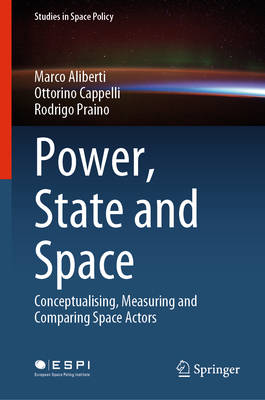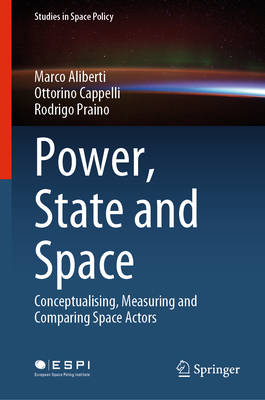
- Afhalen na 1 uur in een winkel met voorraad
- Gratis thuislevering in België vanaf € 30
- Ruim aanbod met 7 miljoen producten
- Afhalen na 1 uur in een winkel met voorraad
- Gratis thuislevering in België vanaf € 30
- Ruim aanbod met 7 miljoen producten
Power, State and Space
Conceptualizing, Measuring and Comparing Space Actors
Marco Aliberti, Ottorino Cappelli, Rodrigo PrainoOmschrijving
This book explains on what basis a nation can claim the status of space power, what are the criteria differentiating a space power from "lesser" space actors, and how their spacepower can be empirically measured and assessed. To this end, it sets forth a comprehensive multidisciplinary framework to enable a dynamic comparison of space actors and of the pathways that lead them in and out of the space powers' club. Drawing upon a critical review of the existing literature, it conceptualises spacepower as a form of state power based on the complex interplay between the two defining dimensions of stateness, namely the well-studied dimension of capacity and the often neglected yet exceedingly important dimension of autonomy.
The book demonstrates that only actors possessing high levels of both autonomy and capacity qualify as space powers. Different levels of either capacity or autonomy produce other types of space actors, including skilled spacefarers, self-reliant spacefarers, primed spacefarers, and emerging space actors. This innovative conceptual framework is complemented by an in-depth comparative assessment that collects and processes a large amount of hard-to-find data on the most active global space actors and aggregates multiple indicators into a compound, non-hierarchical index of space power visualised in the form of a matrix.
Specificaties
Betrokkenen
- Auteur(s):
- Uitgeverij:
Inhoud
- Aantal bladzijden:
- 225
- Taal:
- Engels
- Reeks:
- Reeksnummer:
- nr. 35
Eigenschappen
- Productcode (EAN):
- 9783031328701
- Verschijningsdatum:
- 20/07/2023
- Uitvoering:
- Hardcover
- Formaat:
- Genaaid
- Afmetingen:
- 156 mm x 234 mm
- Gewicht:
- 512 g

Alleen bij Standaard Boekhandel
Beoordelingen
We publiceren alleen reviews die voldoen aan de voorwaarden voor reviews. Bekijk onze voorwaarden voor reviews.











